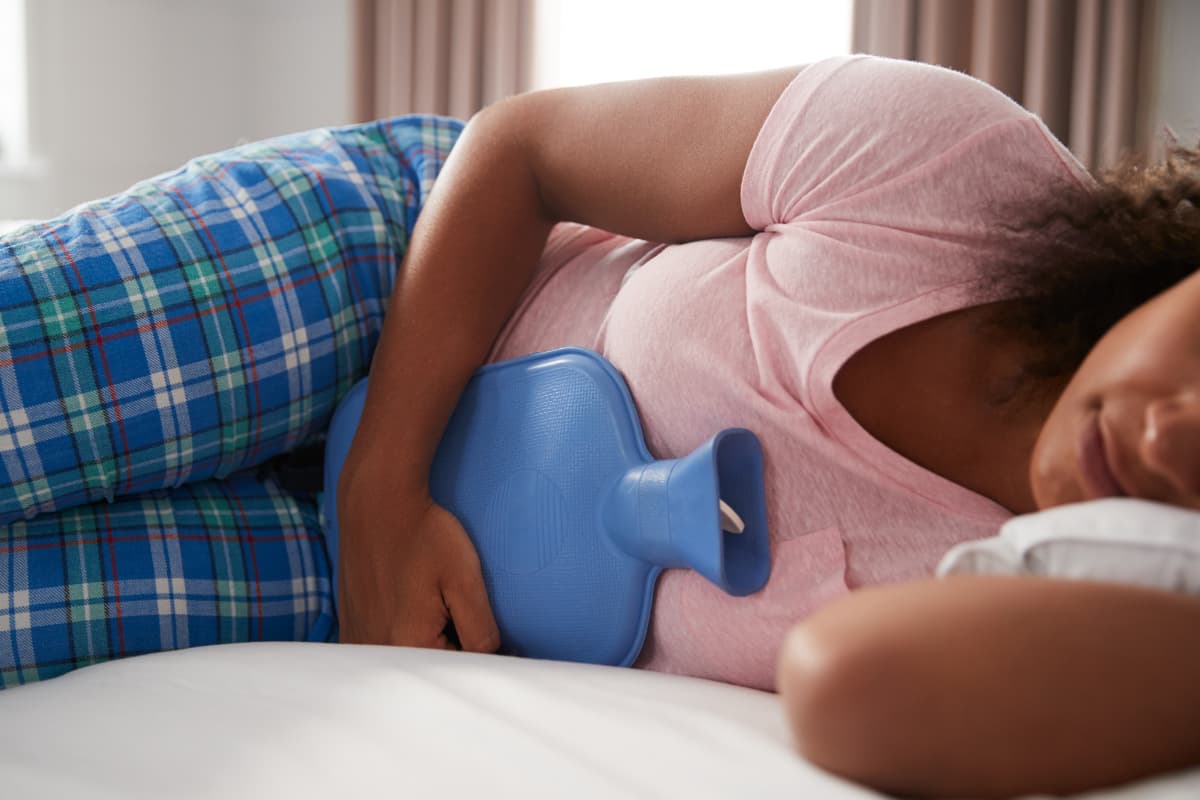What Are the 34 Symptoms of Menopause?

Eighty-five percent of women will experience menopause symptoms, and there are a whopping 34 that make the list. Some symptoms are experienced by most women (hot flashes), while others are more obscure (tingling limbs). In addition to menstrual cycle irregularity, the “Core 4” symptoms – those that most women experience – include hot flashes and night sweats, sleep disturbances, mood issues – increases in depression and anxiety along with having depression for the first time, and genitourinary symptoms like vaginal dryness, painful intercourse, and low libido.
How Do I Know if I’m Perimenopausal or Postmenopausal?
In the early stage of perimenopause, many women are uncertain whether their symptoms are related to starting the menopause transition. They might chalk them up to stress or a busy lifestyle. Symptoms become noticeable for most women in the mid to late stages of perimenopause. If they haven’t already, hot flashes make their appearance for about eighty percent of women. Menopause symptoms and their severity can vary among women and depend on several individual factors. Perimenopausal symptoms may last for months or years, and some menopausal symptoms can persist for up to 10 years after your final period.
When women transition to postmenopause after 12 consecutive months without a period that’s not due to another cause, symptoms usually change, with some getting more severe over time while others become milder or cease altogether. For example, vaginal dryness usually becomes more severe while hot flashes taper off.
If you are unsure whether changes in your body or mood are related to menopause, check out the list below and see which ones apply to you. Many clinicians are not trained in menopausal care and may dismiss your concerns about symptoms if your periods are not yet irregular. Talk to a clinician specializing in menopausal care about what you’re going through, or use our Midday app to request an appointment with a menopause expert at Mayo Clinic.
Symptoms of Menopause
1. Irregular Periods
Menopause signals the end of your reproductive years. In the later phase of perimenopause, your periods will start to become irregular as your hormone production decreases. They can become very erratic and unpredictable. You might have a period in one month that is shorter, the next month no period, and the following month your period shows up again. You are officially postmenopausal when you have gone 12 consecutive months without a period that’s not due to another cause.
2. Hot Flashes
One of the most common symptoms of menopause, hot flashes affect around eighty percent of menopausal women. Hot flashes involve a sudden wave of heat or warmth often accompanied by sweating, reddening of the skin, and rapid heartbeat. They usually last 1 to 5 minutes and can happen several times an hour, a few times a day, or just once or twice a week. Hot flashes frequently are followed by a cold chill. Hot flashes can be managed using holistic or hormonal options.
3. Night Sweats
Essentially, night sweats are hot flashes accompanied by sweating that occur at night and can disrupt sleep. Some women give off enough sweat to dampen their pajamas and sheets, while others have occasional light sweating. Tracking your hot flash triggers can pinpoint the causes of hot flashes and night sweats and lead you to make changes to reduce the impact.
4. Insomnia
Changing hormone levels can affect your body clock, making it more difficult for you to fall asleep or stay asleep. This can happen especially if you have other conditions that affect your sleep – for example, pain, snoring, or if you have consumed alcohol or caffeine before bed. There are many solutions to improve sleep. Most experts recommend starting with simple sleep hygiene techniques.
5. Fatigue
One of the more common symptoms of menopause, many women will notice a feeling of extreme tiredness. Often, fatigue goes hand-in-hand with trouble sleeping, but stress and anxiety can also contribute. Understanding and treating the root cause can help.
6. Vaginal Dryness
As your estrogen level drops, natural lubrication also drops, and vaginal tissue gets thinner. This can cause some pain and discomfort, particularly during sex. Thankfully, there are several remedies for this, including over-the-counter lubricants and moisturizers and hormonal and non-hormonal prescription options for more severe cases.
7. Pain During Sex
Vaginal dryness often leads to painful sexual intercourse, but that’s not necessarily the only cause, and you should discuss painful sex with your clinician. Most women find that lubricants and moisturizers make sex comfortable and pleasurable again. If this is not the case for you, ask your clinician about additional treatment options available by prescription.
8. Low Libido
With the decline in estrogen, it is fairly common for women to experience a decrease in their sex drive. Some women find that they don’t miss being sexually active. For others, the lack of interest can create relationship problems or a longing for desire. Reframing sex can help, as can consulting a sex therapist. There are also prescription options available that can boost your sex drive.
9. Mood Swings
Mood swings can make you feel like you are on an emotional rollercoaster that you can’t get off. One minute you are feeling up, and the next, you’re down. It’s natural to have some shifts in mood. However, mood swings can become extreme and make relationships difficult. Talking to your partner, family, and friends about menopause and what you are experiencing can make a difference.
10. Anxiety
Along with mood swings, women may notice increased feelings of anxiety. When you’re anxious, you may feel tense or nervous, have worrying thoughts, and have physical changes. As many as one in three women may experience anxiety during menopause. Certain forms of meditation and mindfulness practices can lower anxiety or connect with a mental health professional if anxiety is interfering with your life.
11. Irritability
Your hormones play a large role in contributing to your emotions, and the fluctuation can lead to feelings of sadness, irritability, or even rage.
12. Depression
Depression is four times more likely to affect women of a menopausal age than a woman below the age of 45. Women with a previous history of depression are especially at risk, but many women with no history report first-time feelings of depression. If depression is getting you down, seek help from your clinician.
13. Panic disorder
Menopausal women are actually more susceptible to panic attacks. A panic attack is a sudden episode of intense fear that triggers severe physical reactions when there is no real danger or apparent cause. Talk to a mental health professional if you’re experiencing this symptom.
14. Irregular heartbeat
This feels like a pounding, racing, or fluttering heartbeat and can occur during a hot flash. It’s usually harmless, but consult a clinician to be sure.
15. Muscle tension
A feeling of tightness in the muscles. Muscle tension can be associated with stress and anxiety. Techniques like progressive muscle relaxation, body scan, yoga, and meditation can help lower stress and anxiety and ease tension.
16. Joint pain
You may experience stiffness, aches, soreness, and inflammation in your joints, particularly in a previous injury site. Not all joint pain is related to arthritis. Regular movement, stretching, and eating anti-inflammatory foods can help.
17. Tingling extremities
One of the more rare symptoms, you may have a tingling sensation in the feet, hands, arms and legs, but any part of the body can be affected.
18. Headaches
If you previously had hormone-related headaches and migraines, they may become more frequent and severe in peri and postmenopause due to the fluctuation in hormones.
19. Hair loss
When estrogen declines, hair becomes thinner. You may also find that hair turns dry, brittle, frizzy, and prone to breaking. Be gentle with your hair. Avoid pulling on hair and too much heat. Practice a healthy lifestyle. Food, sleep, and stress all contribute to hair health.
20. Itchy skin
Thin, dry, itchy skin is also due to the decline of estrogen, which helps keep our skin plump and firm. Keep skin moist and get plenty of hydration.
21. Difficulty concentrating
Brain fog is usually the term used to describe difficulty in focusing and lack of mental clarity.
22. Memory lapses
Forgetfulness is common as we age. It does not mean you have dementia. For many women, the effect is temporary. Keep your brain healthy by getting plenty of exercise, eating brain-healthy foods, and engaging in challenging activities.
23. Weight gain
Weight gain is actually not due to menopause, but many women associate it with menopause. Weight gain is a function of aging and slowing metabolism. What is a cause of menopause is the deposit of fat around the midsection, also known as “belly fat.”
24. Abdominal bloating
Water or gas retention is usually the culprit for abdominal bloating. Fortunately, there is a range of lifestyle changes you can make to ease this symptom.
25. Constipation
Again, we can blame the decline of estrogen for slowing down our system, but sometimes medications can be the cause. More physical activity and fiber usually do the trick.
26. Nausea
Possible causes include a natural drop in hormone levels, hot flashes, or side effects from menopausal hormone therapy. Avoid foods that make nausea and hot flashes worse, and take steps to manage your hot flashes.
27. Urinary incontinence
Bladder leakage may occur as your pelvic muscles weaken as you age or due to childbirth. Simple exercises or specialized physical therapy for the pelvic floor can often help.
28. Breast soreness
Hormone fluctuations can cause your breasts to become more tender. However, discussing breast health with your clinician and conducting regular self-exams and mammograms is always a good idea.
29. Burning mouth
Decreased saliva levels during menopause can lead to ‘burning mouth syndrome,’ with about 10-40% of women of perimenopausal age reporting this symptom.
30. Gum problems
Particularly for postmenopausal women, oral health may decline, and gum disease occurs. More frequent and rigorous dental hygiene is essential to avoid tooth loss.
31. Dizzy spells
The jury is still out on whether this symptom is due to menopause or aging. There are many reasons for dizziness or vertigo, and you should consult your clinician to rule out other causes.
32. Brittle nails
As with skin and hair, with less estrogen, your nails may become weak and prone to breaking or splitting.
33. Allergies
The link between menopause and the appearance of or increase in allergies is not well-understood, but the theory is that the decrease in estrogen can increase the production of a body chemical called histamine, which can trigger an allergic response.
34. Osteoporosis
Bone density starts to decline during perimenopause and accelerates in postmenopause. At any point, you can take steps to improve bone health, but earlier is better.
For expert support on managing all 34 symptoms of menopause, download Midday, the leading science-backed menopause app for menopause and healthy aging.
Sign up for more unique women’s health content
By submitting this form, you agree to the Lisa Health Privacy Policy and Terms of Use


